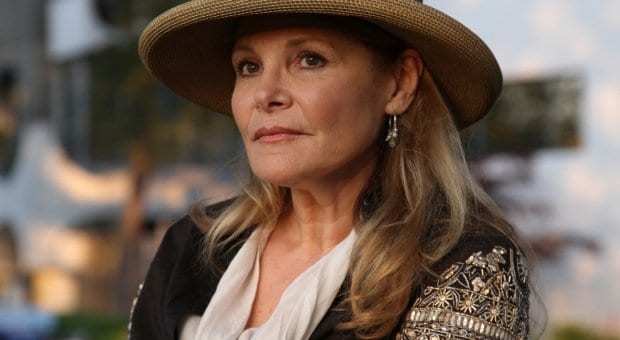Helen Shaver is in that distinct league of actors who are consistently great in every role they take on. One look at her face conjures up images of vivid performances in such films as Sam Peckinpah’s The Osterman Weekend (1983) or Martin Scorsese’s The Color of Money (1986), in which she played Paul Newman’s romantic interest. And for queer movie lovers, Shaver will always be remembered for the landmark page-to-screen adaptation of the Jane Rule novel Desert Hearts (1985), in which she played a lesbian writer struggling to find love with Patricia Charbonneau in a time of repression.
Since establishing herself as an actor, Shaver has also won accolades as a director, working on numerous TV series (including Flashpoint, The Firm and The Republic of Doyle). But she has returned to acting once again for the low-budget film Down River. In it, she plays a character who mentors three feisty, young, ambitious women while facing her own battle with terminal cancer. It’s another beautiful performance. “When [writer-director] Benjamin Ratner showed me the script, I said yes,” Shaver says from her Vancouver home. “He was doing it on a very low budget. This was truly independent work. I thought the script was powerful.”
Shaver says she didn’t feel the need to do any research into cancer and the terminally ill. “My lifetime has been my research,” she says, noting, “I walked a loved one through the last year of their life. My observation was that dying takes a lot of energy. I’ve witnessed and been part of the process.”
Soon after starting work on Down River, Shaver says, life began imitating art in a rather uncomfortable way. “Three people I care about very deeply were diagnosed with cancer within months of my embarking on this.” If the film has an air of authenticity, it owes part of that to the fact that Ratner was inspired to make the film after his close friend and fellow actor Babz Chula lost her fight to the disease in 2010.
Taking on challenges is something Shaver has never avoided. “When I chose to take the role in Desert Hearts, many people told me I was crazy. Back then, there really weren’t many feature films that were about lesbian love. People told me this could do real damage to my career. I thought it was a beautiful love story.”
Director Donna Deitch offered to help Shaver, who is straight, prepare for her role. “She asked me, ‘Do you want me to tell you about the first time I made love to a woman?’ I said no. She seemed a bit surprised, but to me, if you’re really in love with somebody, it’s the same thing.”
When Desert Hearts was given an award by GLAAD, Shaver and Charbonneau surprised everyone onstage by appearing alongside Deitch, who accepted the honour. “Everyone rose to their feet and gave us a standing ovation. After I got over the adrenaline rush, the applause was still going on. I thought, ‘If I never do anything again besides paying the rent, that’s okay, because I’ve made a movie that changed people’s lives.’”
Shaver also got to have a scene in bed with Paul Newman in The Color of Money. “I was sitting there in bed with him, and Martin Scorsese was talking about film preservation in between takes, and I had this out-of-body experience. I was looking down on myself from above: Hey, you’re in bed with Paul Newman and working with Martin Scorsese! But hey, I had love scenes with Tom Beringer, Donald Sutherland, Martin Sheen and Fred Ward. Beringer was so gorgeous; it was as if Newman and Steve McQueen had had a baby.”
Shaver remained close friends with Newman, and she recalls one 1991 dinner in Manhattan that affected her greatly. “Paul and Joanne Woodward took me out to dinner with Joe Pesci. Joanne took me aside and said, ‘From the age of 45 to 65, you’ve got to find something else to do, because the roles aren’t good for women in that range. Unless you want to cut your face up,’” the Oscar-winning Woodward said, referring to cosmetic surgery.
Shaver heeded the warning and got into directing, a job she says she loves. The gender-age divide in Hollywood — where male actors can continue working throughout middle age, while women are declared past their best-before date — is starting to change, Shaver thinks. “This is the golden age of television. The roles for women in shows like House of Cards and Homeland are very strong.”
In the meantime, she advises that “People should be honest about their age. Trying to lie about it or cover it up won’t work. I just celebrated my 63rd birthday. The reason we have same-sex marriage now is because people came out and were honest about being gay. If you’re not honest, nothing will ever change.”
Down River is now playing in theatres.

 Why you can trust Xtra
Why you can trust Xtra


